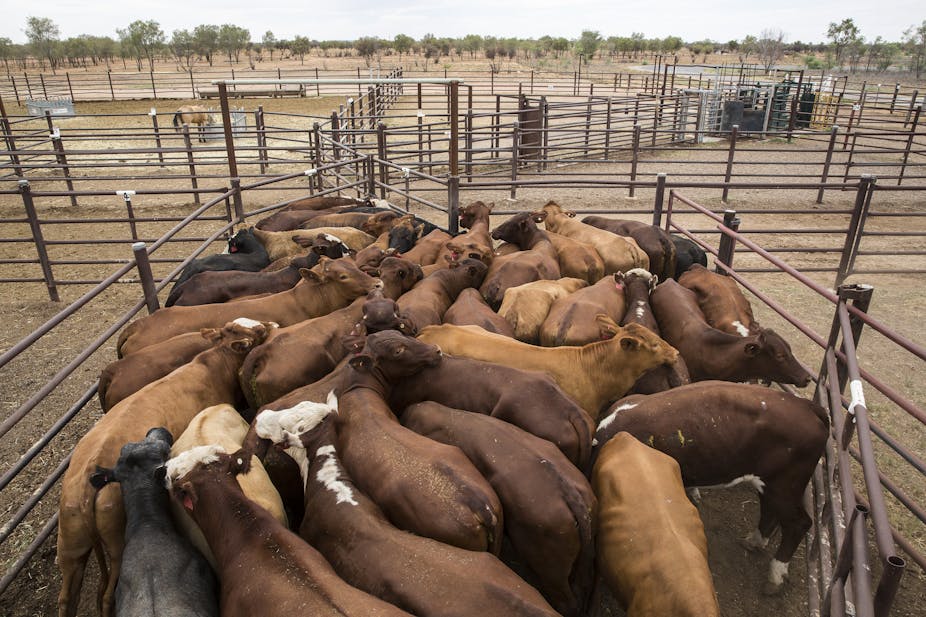The number of animals exported live out of Australia is set to increase as Australia prepares to enter into a A$1 billion trade agreement with China. Agriculture minister Barnaby Joyce has claimed up to a million Australian cattle may in the future be exported each year.
Live animal exports has been a divisive political issues in recent years. Passions reached boiling point when Prime Minister Gillard temporarily suspended the trade following a Four Corners exposé based on footage gathered by Lyn White and her team at Animals Australia.
Since then, the trade has recommenced. The former Labor Government introduced a live export tracking system called the Exporter Supply Chain Assurance System (ESCAS); Lyn White has been awarded an Order or Australia; and under the Abbott government live animal exports have expanded, including into China as a new market.
Meanwhile, the community appears not to have changed it’s mind that live animal exports are cruel and a serious question mark hangs over the government’s ability to police, and enforce, its own rules under the assurance system.
In my view the deal with China is likely to increase the suffering of Australian cattle.
Animal welfare in China
Unlike Australia, China has no comprehensive animal welfare law.
On March 1 2010, a draft of China’s first animal welfare law, called the Animal Protection Law of the People’s Republic of China, was submitted to the Standing Committee of the National People’s Congress.
The Standing Committee is a de facto legislative authority with considerable political power. That draft law received quite vocal opposition from sections of the community and some members of China’s ruling elite. In particular, a prohibition on the slaughter of dogs for meat (for human consumption) was controversial.
As a result of that opposition, three months later on 10 June 2010, a second, more watered-down version of the original draft law was presented to the same Standing Committee.
The second law, called the Prevention of Cruelty to Animals Law of the People’s Republic of China, contains markedly fewer prohibitions against cruelty to animals and permits the slaughter of dogs as meat.
An examination of both draft laws reveals that whereas the first proposed law had 53 clauses relating to animals raised for economic purposes, the second has only 29.
However, this may be a moot point as in the four years since being submitted for consideration, neither law has shown any sign of progressing through the Chinese political process and neither is likely to become law anytime soon.
Kill cows in Australia
The world’s first modern animal welfare law was introduced in the UK in 1822. That law was enacted following more than two decades of legislative advocacy and followed several earlier, failed attempts, at getting similar laws through parliament.
The law that was eventually enacted in 1822 was a political compromise and contained only a small proportion of the provisions included in the unsuccessful bills.
If the UK experience is anything to go by it could be many decades before China has an animal welfare law, and even then it is likely to be extremely weak.
Of course Australia was not exporting cattle to the UK in 1822, yet it appears that we will soon be sending our animals to China.
While Australian animals who find themselves in China will not have to face the horrors of ritual slaughter, as they do in the Middle East, they will nonetheless face the possibility of being killed by people who have minimal skill, little-to-no training and who may be working in very basic conditions.
As we have seen in the Middle East, not all exported Australian animals make it to a slaughterhouse.
Yet, even if Australian animals do find themselves in the most modern Chinese slaughterhouse they will die in a country with zero rules prohibiting animal cruelty. If we think prohibitions against cruelty serve a purpose, this should be a troubling scenario.
I’m a strict vegetarian. I’m not for killing cows. But if I were an Australian cow, and I were to be killed, I would prefer to be killed in Australia than to take my chances in China.
I don’t think China is a good place for cows, particularly Australian cattle. Australian animal welfare laws are far from perfect, but at least they exist.

